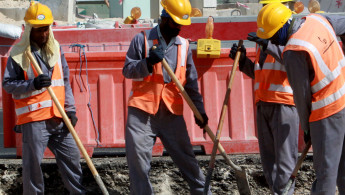Qatar to introduce pay reforms for foreign workers
Qatar said Thursday it will introduce a major labour law reform to ensure thousands of workers building venues for the 2022 World Cup are paid on time, after complaints by rights groups.
The changes by the future hosts of football's biggest tournament, approved by Qatar's Emir Sheikh Tamim bin Hamad al Thani, will see workers get paid at least once a month and in some cases every fortnight.
Qatar has come under mounting international pressure to improve conditions for migrant labourers working on projects for the World Cup.
Under the proposal, wages will be paid through direct bank transfers which should, in theory, make it easier to track those employers that do not comply with the new law.
It is not yet clear when the reforms will be introduced but employers will have six months to implement them.
If they do not, they could face up to one month in prison as well as a fine of up to 6,000 Qatari Riyals ($1,650, 1,440 euros).
Non-payment of migrant workers, especially those in the construction sector, has become a sensitive issue for Qatar.
Last November, Amnesty International accused the government in Doha of not doing enough on the issue of non-payment despite intense scrutiny after Qatar was the World Cup.
And earlier this year, lack of progress on the issue was again highlighted, this time by Human Rights Watch (HRW).
HRW's Qatar researcher, Nicholas McGeehan gave a cautious welcome to the changes announced in Doha.
"Of course it's good," he said. "It is a positive step as long as it is properly enforced."
He added that the reform would also impact on a "very substantial number of workers" across the Qatari economy, not just those in construction.
A 2013 academic study, "A Portrait of Low-Income Migrants in Contemporary Qatar", found that 21 percent of migrant workers in Qatar "received their salary on time only sometimes, rarely, or never".
However, there was some disappointment that the changes announced did not address the controversial "kafala" sponsorship system, which rights groups have urged Qatar to abolish.
This enables employers to prevent foreign workers from leaving the country or changing jobs.
"That's a concern," said McGeehan. "Why is this area changing first? Are they working around the edges and avoiding the core problem?"
Other areas where campaigners have called for change include issues such as the confiscation of passports by employers, workers not being issued an exit visa so they can leave Qatar, and migrant labourers having to pay recruitment fees.





 Follow the Middle East's top stories in English at The New Arab on Google News
Follow the Middle East's top stories in English at The New Arab on Google News
![The UAE is widely suspected of arming the RSF militia [Getty]](/sites/default/files/styles/image_330x185/public/2024-11/GettyImages-472529908.jpg?h=69f2b9d0&itok=Yauw3YTG)
![Netanyahu furiously denounced the ICC [Getty]](/sites/default/files/styles/image_330x185/public/2024-11/GettyImages-2169352575.jpg?h=199d8c1f&itok=-vRiruf5)
![Both Hamas and the Palestinian Authority welcomed the ICC arrest warrants [Getty]](/sites/default/files/styles/image_330x185/public/2024-11/GettyImages-2178351173.jpg?h=199d8c1f&itok=TV858iVg)